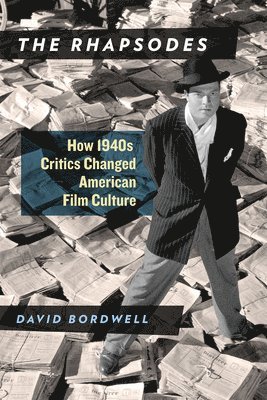
- Format
- Häftad (Paperback / softback)
- Språk
- Engelska
- Antal sidor
- 176
- Utgivningsdatum
- 2016-04-04
- Förlag
- University of Chicago Press
- Illustrationer
- , black & white illustrations
- Dimensioner
- 226 x 152 x 13 mm
- Vikt
- Antal komponenter
- 1
- ISBN
- 9780226352206
- 227 g
The Rhapsodes
How 1940s Critics Changed American Film Culture
- Skickas från oss inom 5-8 vardagar.
- Fri frakt över 249 kr för privatkunder i Sverige.
Passar bra ihop
De som köpt den här boken har ofta också köpt Who's Afraid of Gender? av Judith Butler (inbunden).
Köp båda 2 för 544 krKundrecensioner
Fler böcker av David Bordwell
-
Film Art: An Introduction ISE
David Bordwell
-
Minding Movies
David Bordwell, Kristin Thompson
-
Narration in the Fiction Film
David Bordwell
-
ISE Film Art: An Introduction
David Bordwell
Recensioner i media
"Highly entertaining. . . . [Bordwell] is equally attentive to the four writers' idiosyncratic prose styles and to the strategies they used to argue that mainstream movies were an art form worthy of serious study."--Nick Pinkerton "Library of America" (5/5/2016 12:00:00 AM) "Illuminating. . . . Bordwell probes each critic's work and shows how they took mainstream Hollywood film, and writing about it, seriously."--Phillip Lopate "Publishers Weekly" (4/25/2016 12:00:00 AM) Bordwell pays homage to a generation of critics lost to time and reintroduces them to a modern audience--those who read this book will be grateful."--Phillip Lopate "Library Journal" (4/25/2016 12:00:00 AM) "Bordwell pinpoints a time in movie history when a whole new dialogue was opened up between viewers and filmmakers, and he does it with a deep love of not just pictures, but, especially, of words. The writing floats and bounces, there's jaunt and inspiration here, as good as the best work of the critics he writes about."--David Koepp, screenwriter, Jurassic Park and War of the Worlds; director, Ghost Town and Premium Rush "In this wonderfully engaging history, Bordwell looks at the DNA of American film criticism to show how four film-lovers-turned-movie-critics helped lead a revolution in contemporary thought. Going wide and deep, with expressive detail and unforced historical sweep, Bordwell shows how the four men he calls the Rhapsodes--Otis Ferguson, James Agee, Manny Farber and Parker Tyler-- by taking movies seriously (if rarely themselves), made an argument for the movies that demolished old high-low snobberies and ushered in a new age of cinephilia. Bordwell, one of our greatest film historians and theorists, proves yet again that he's also one of our greatest critics."--Manohla Dargis, co-chief film critic, New York Times "This marvelously readable, refreshing book is both enlightening and hugely entertaining. Bordwell, our preeminent bridge between scrupulous film scholarship and lively, accessible prose style, has outdone himself with this much-needed study of four pioneering film critics. Most impressive is the generous spirit with which he appreciates the characteristics and virtues of each writer, who are very different one from another (and from himself), while simultaneously setting their accomplishments in a broader context of the history of American criticism and popular taste. In doing so, he shows he is their peer as well as their grateful inheritor."--Phillip Lopate "While each of the subjects of The Rhapsodes has come in for their appreciation in turn at one time or another, Bordwell's unique accomplishment is to situate them within the larger context of American arts journalism. . . . As one reasonably well-acquainted with all of Bordwell's Rhapsodes, much information here was new to me. . . . There are also Bordwell's typically lucid close reads of each writer's idiosyncratic style. . . . This slim volume is worth an even dozen critic memoirs--and in recounting Ferguson's call to arms for a film criticism worthy of its subject, it sounds a reveille of its own."--Nick Pinkerton "Sight & Sound" (5/2/2016 12:00:00 AM) "The primary pleasure of this book comes from Bordwell's appreciation of the originality of these writers, the way each of them constructed a distinctive prose whose mixing of unlike elements calls to mind that homemade world that the critic Hugh Kenner discerned in the poetry of William Carlos Williams and Wallace Stevens. There is real enthusiasm, and valuable guidance, in Bordwell's tour, as he plucks out particularly lively or audacious passages. He walks us through the literature with an admirably light step, pointing out highlights and connecting dots, and, as he goes, filling in some of the background of the 1940s intellectual milieu in which these men worked. . . . The Rhapsodes elicits an awareness of j
Övrig information
David Bordwell is the Jacques Ledoux Professor of Film Studies Emeritus at the University of Wisconsin-Madison. With Kristin Thompson, he is coauthor of Film Art: An Introduction and Film History: An Introduction and the blog Observations on Film Art, which can be found at http: //www.davidbordwell.net/blog.


